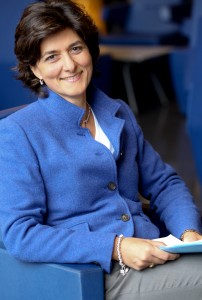
Member of the Eiffel group and board member of United Europe
In the run-up to the European elections, a group of well-known French EU experts has made a radical proposal to push forward with European integration. The “Eiffel group”, as it is named after the view from its Paris meeting room, proposes turning the Eurozone into a genuine political community with a government and a parliament of its own.
“We propose a Euro Community, open for other European countries to join, and with a positive global outlook, not because the euro would be an end point in itself, but rather because it expresses a common destiny,” the manifesto said. “To turn our back on Europe would today be anachronistic, and tomorrow suicidal.”
One of the authors is Sylvie Goulard, a French liberal and member of the European Parliament who is also member of the board of United Europe. Other members of the Eiffel group come from business, civil service or academia. In its manifesto, the Eiffel group sharply criticises the current Eurozone policies as undemocratic and untransparent. “The level of intrusion which has been reached, notably in programme countries, is fuelling a dangerous resentment between “The North” (essentially Germany) and “The South”. The euro has become the source of divisions.”
Yet the costs of abandoning the euro would be terribly high. “This hypothesis is nothing but an illusion,“ the group says. “A calm analysis, on the contrary, points towards continuing and accelerating the reconstruction of the Economic and Monetary Union.”
As a solution, the French group proposes creating a political euro community with a government and a parliament that would be elected on the same day and according to the same rules in all the euro countries. “The Euro Community must offer democratic guarantees in line with the highest standards in the member countries,” the group says.
The new political entity’s first mission would be to consolidate the common currency. But according to the Eiffel group, it mustn’t stop there. “Without calling the mutual commitment for solid public finances into question, nor the reform efforts achieved during the crisis, the Community will be endowed with new instruments intended to absorb fluctuations in the economic situation and to support the most vulnerable people.”
The Eiffel group follows a similar German initiative for instituting a two-speed Europe. Last autumn, the so-called Glienicke group, consisting of leading German economists, lawyers and political scientists, called for the institution of an economic government and a parliament for the Eurozone.
Now, clearly, it’s France’s turn. “We are absolutely convinced that a new momentum can and must be given, and a new milestone reached”, the manifesto says. “The time is now. Citizens who wish to support the project must urgently react together, surpassing questions of national borders and sensitivities.”


